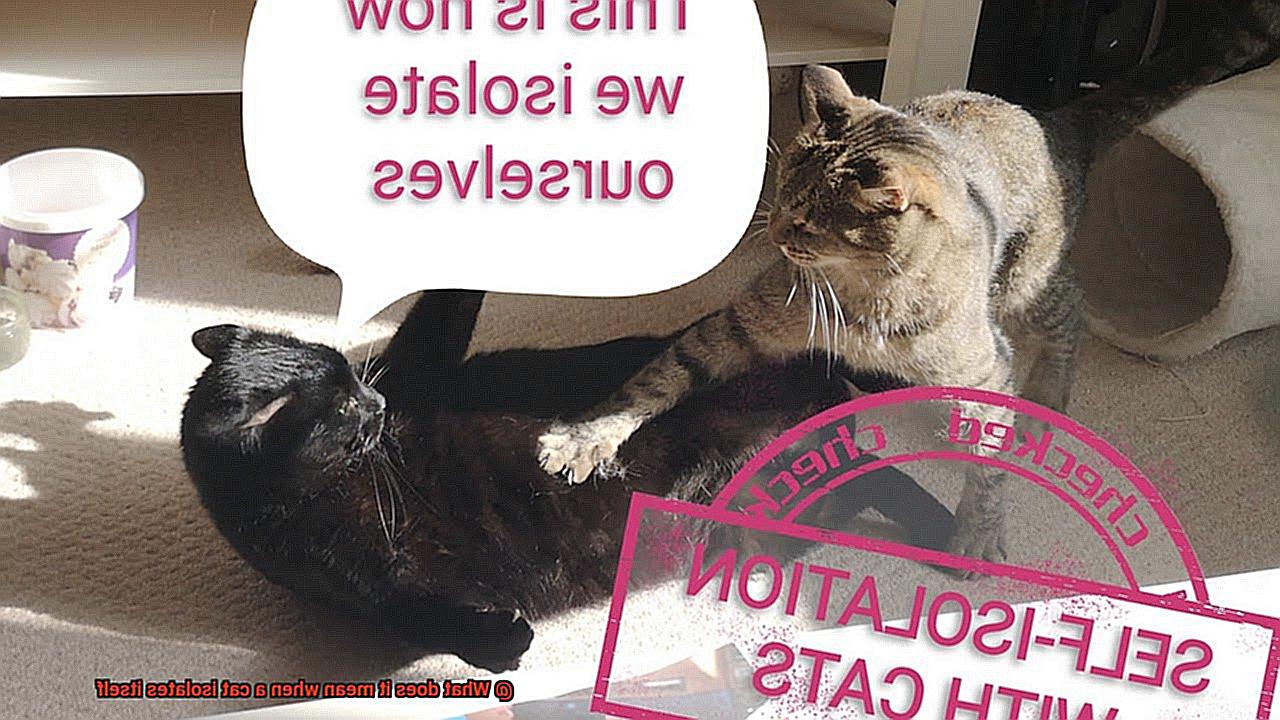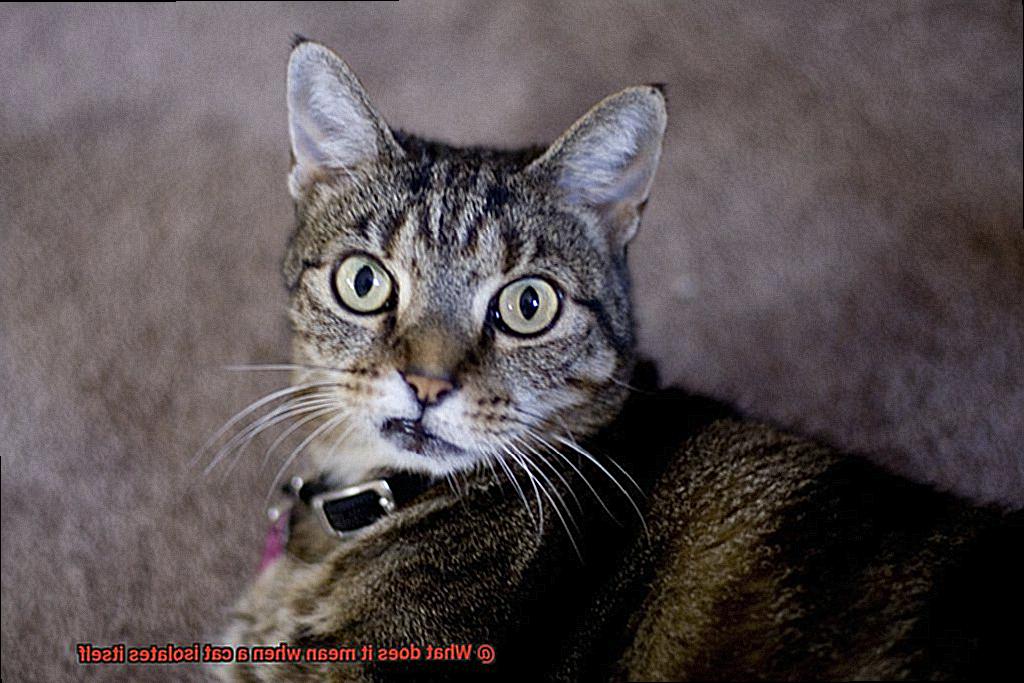Cats are intriguing creatures, with a reputation for being independent and aloof. But what does it mean when your feline friend starts to isolate itself? As a pet owner, it’s natural to feel concerned and wonder about their behavior. While isolation is not uncommon among cats, it’s essential to recognize the signs and understand what they mean for your cat’s well-being.
As a cat lover, you’re probably familiar with your furry friend’s low-maintenance and self-sufficient nature. However, when they begin to withdraw or distance themselves from you, it can be unsettling. Is this a sign of sickness, stress or anxiety? These are just some of the questions that might cross your mind when you notice your cat isolating itself.
In this blog post, we’ll explore why cats isolate themselves and what it means when they do. We’ll also provide tips on how you can help your feline companion during these times. By gaining a better understanding of your cat’s behavior, you’ll be better equipped to provide them with the care and attention they need to thrive. So sit tight, relax, and let’s dive into the world of cat isolation.
What Does It Mean When a Cat Isolates Itself?

Isolation in cats can manifest in different ways, including hiding, avoiding social interaction, and spending more time alone. Here’s what you need to know about why your cat might be isolating itself:
- Stress and Anxiety: Cats are sensitive creatures that can become overwhelmed by changes in their environment. Moving to a new home, the introduction of a new pet, or loud noises can all cause stress. Changes in routine or lack of stimulation may also contribute to anxiety. If your cat is stressed, they may seek isolation as a way to cope.
- Illness or Pain: Cats are masters at hiding their pain, and isolation can be an indicator that something is not right. Your cat may retreat to a quiet corner to avoid any additional stress or discomfort. If your cat suddenly starts isolating themselves, it’s important to take them to the vet for a check-up to rule out any underlying health issues.
- Senior Cats: As cats age, they tend to isolate themselves more. They may have difficulty hearing or seeing, making them more vulnerable and prone to stress. Senior cats may also spend more time sleeping and resting, leading to isolation.
- Depression: In some cases, isolation can be a sign of depression in cats. This can happen when cats experience significant changes in their environment or routine, such as the loss of a companion animal or owner.
As a responsible pet owner, it’s important to monitor your cat’s behavior and look for any signs of distress. If you notice that your cat is isolating itself more than usual, take action. This may involve taking your cat to the vet for a check-up or making changes to its environment to reduce stress levels.
Common Reasons Why Cats Isolate Themselves
Cats are known for their independent nature, but when they isolate themselves excessively, it could indicate an underlying issue. Here are five common reasons why cats isolate themselves:

Stress and Anxiety
Cats are sensitive creatures, and any change in their environment can trigger stress, prompting them to retreat into their safe space. For example, if you recently moved into a new home or brought a new pet into the house, your cat may feel overwhelmed, leading them to isolate themselves. Loud noises or sudden movements can also startle cats and prompt them to retreat into their safe space. If your cat is isolating themselves and displaying other signs of stress such as vomiting or diarrhea, it’s essential to identify and address the source of their anxiety.
Illness and Injury
Cats may isolate themselves when they feel sick or in pain to rest and recover. If your cat is not eating or drinking, has a change in behavior, or shows any signs of discomfort or pain, it’s essential to take them to the vet as soon as possible.
Aging
As cats age, they may become less active and prefer to spend more time alone. However, excessive isolation in senior cats could indicate an underlying medical condition that requires attention.
Territorial Behavior
Cats are territorial animals and may isolate themselves if they feel threatened by other animals in their environment. If you have multiple cats in your household, it’s essential to provide each cat with their own space and resources to prevent territorial conflicts.
Depression
Cats can suffer from depression when they experience significant changes in their environment or routine, such as the loss of a companion or owner. Signs of depression in cats include decreased appetite, lethargy, and excessive sleeping.
Stress and Anxiety in Cats
As much as we love our feline friends, we can’t always keep them stress-free and anxiety-free. Stress and anxiety in cats can manifest in various ways, but one of the most common symptoms is isolation. When a cat isolates itself, it may be trying to cope with stress or anxiety by avoiding stimuli that trigger negative emotions.
There are many reasons why a cat may become stressed or anxious, such as changes in their environment, the introduction of new pets or people, illness or injury, or even boredom. It’s crucial to identify the root cause of your cat’s stress and anxiety so you can take steps to alleviate it.
The signs of stress and anxiety in cats can vary; some common ones include hiding, decreased appetite, excessive grooming, aggression, and vocalization. If you notice any of these behaviors in your cat, it’s essential to address the issue promptly to prevent further harm.
Luckily, there are various strategies you can use to help reduce your cat’s stress and anxiety levels. Here are some tips:
- Provide a safe and comfortable environment: Make sure your cat has a quiet place to retreat to when they feel anxious or stressed. This could be a cozy bed or a hiding spot.
- Establish routines: Cats thrive on routine, so try to keep their feeding and playtime schedules consistent.
- Provide toys and stimulation: Interactive toys and scratching posts can help keep your cat entertained and stimulated.
- Give your cat plenty of attention and affection: Spending time with your cat, playing with them, and giving them lots of love and attention can help reduce their stress levels.
If your cat’s stress levels are severe or persistent, it may be necessary to consult with a veterinarian or animal behaviorist for additional support. They may recommend medications or other interventions to help your cat feel better.
Illness and Pain in Cats
So when your cat starts to isolate themselves from the rest of the household, it can be a cause for concern. As an expert on illness and pain in cats, I’m here to explain why your cat may be exhibiting this behavior and what possible causes could be at play.

One of the most common reasons for a cat’s desire for solitude is pain or illness. However, cats are notorious for hiding their discomfort, making it crucial to pay attention to any changes in behavior or habits. If you notice your cat isolating themselves more than usual, keep an eye out for other symptoms like decreased appetite, lethargy, or changes in litter box habits.
Several illnesses could cause a cat to isolate themselves, including urinary tract infections, kidney disease, and gastrointestinal issues. Dental problems and arthritis are also common culprits that can lead to a cat’s desire for solitude. If you suspect your cat may be ill or in pain, take them to the veterinarian for a check-up.
It’s essential to note that some cats may isolate themselves as a way of coping with stress or anxiety. Changes in their environment such as moving to a new home or the addition of another pet can trigger feelings of anxiety in cats. If you suspect stress may be the cause of your cat’s behavior, providing them with a safe and comfortable space where they can retreat when they need to can help ease their stress levels.
Depression in Cats
However, just like humans, cats can suffer from depression, which can significantly impact their well-being. Identifying the causes and symptoms of depression in cats is crucial to ensure they receive the care they need.
One significant reason why cats may isolate themselves is depression. Depression in cats is a severe condition that can affect their appetite, sleeping patterns, and social interactions. Signs of depression in cats include lethargy, avoidance of social interaction, excessive grooming, and aggression. It’s essential to be attentive to these symptoms and seek veterinary care if necessary.
Grief is a common cause of depression in cats. Cats are social animals that can form strong bonds with other cats or even their owners. When a companion cat or owner passes away, the remaining cat may become depressed and isolate themselves as a coping mechanism. During this difficult time, it’s crucial to provide extra attention and care for your cat. Spend quality time with them, offer comfort, and ensure they’re eating and sleeping well.
Changes in their environment can also cause depression in cats. Moving to a new home or introducing a new pet into the household can be stressful for cats and lead to isolation. Providing a comfortable and safe space for your cat with familiar objects and smells can help ease this transition.

Lack of attention from their owners can also contribute to depression in cats. Cats need mental stimulation and social interaction to thrive; thus, it’s essential to spend quality time with them each day. Play with toys, groom them regularly, or just sit with them – these simple actions can significantly impact their mood and overall well-being.

How to Monitor Your Cat’s Behavior
One way to ensure this is by monitoring their behavior. Here are five sub-sections on how to monitor your cat’s behavior:

Establish What is Normal for Your Cat
The first step in monitoring your cat’s behavior is to understand what is normal for them. This means knowing their eating and sleeping habits, level of activity, and socialization patterns. By establishing what is typical for your cat, you can quickly identify any changes that may indicate a problem.
Keep a Journal of Activities
Keeping a journal of your cat’s activities can help you track any changes in their behavior over time. Note down when they eat, sleep, play, and use the litter box. Record any changes in their behavior or habits, such as if they become more vocal or start hiding more often. This information can be useful to your veterinarian if needed.
Observe Body Language
Cats communicate through body language, and observing your cat’s posture and movements can provide valuable insights into how they are feeling. For example, if your cat is holding their ears back and tucking their tail under their body, it could be a sign that they are scared or anxious. Pay attention to any changes in your cat’s body language to detect any changes in mood.
Provide a Stimulating Environment
Cats need a stimulating environment to prevent stress and boredom. This can include toys, scratching posts, and perches for your cat to climb on. It’s also important to play with your cat regularly and provide them with affection and attention.
Consult with Your Veterinarian
If you notice any concerning behavior or changes in your cat’s routine, it’s best to consult with your veterinarian. They can rule out any underlying medical conditions and provide advice on how to address behavioral issues.
Signs of an Underlying Medical Condition or Behavioral Problem
It could be a sign of an underlying medical condition or behavioral problem. Let’s dive deeper into the signs you should look out for.
Firstly, medical conditions can cause cats to isolate themselves. Cats are known to hide their pain and discomfort, so it is crucial to be vigilant and attentive to their behavior. Your cat may isolate themselves as a way to cope with the pain and discomfort they are feeling. They may also become lethargic, lose their appetite, and exhibit other signs of illness such as vomiting or diarrhea. Medical conditions such as urinary tract infections, kidney disease, dental problems, and arthritis can all cause cats to isolate themselves.
On the other hand, changes in their environment can cause behavioral problems that lead to isolation. Cats are creatures of habit and any disruption can cause stress and anxiety. If your cat is experiencing a behavioral problem, they may isolate themselves due to fear or stress. Changes in their environment such as a new pet or family member, moving to a new home, or changes in their routine can all cause stress and anxiety in cats. Some behavioral problems that can cause your cat to isolate themselves include separation anxiety, fear and phobias, and aggression towards other pets or people.
If you notice any of these signs in your feline friend, it’s essential to identify the cause of their behavior and address it appropriately. This may involve training, environmental changes, or medication. By paying attention to your cat’s behavior and seeking veterinary care if necessary, you can help ensure that your feline companion stays healthy and happy.
How to Reduce Stress Levels for Your Cat
Stress in cats can lead to various health problems such as digestive issues, skin problems, and even depression. Here are five effective ways to reduce stress levels for your feline friend:
Create a Safe and Comfortable Environment
Cats need a space where they can feel safe and secure. Providing them with a cozy bed, toys, scratching posts, and other essentials that make them feel comfortable can go a long way in reducing their stress levels. Additionally, providing a quiet room or space where they can retreat when feeling overwhelmed can help them feel more relaxed.
Use Pheromone Products
Pheromone products, such as sprays or diffusers, can help reduce stress in cats by mimicking the natural pheromones that cats produce when they feel calm and relaxed. These products can be particularly useful when introducing a new pet into the household or moving to a new home. Using these products can create a calming atmosphere for your cat and reduce their anxiety.

Regular Playtime
Regular playtime is an excellent way to reduce stress levels for your cat. Engaging your cat in playtime helps them release energy and stress while also strengthening the bond between you and your pet. Interactive toys like puzzle feeders or toys that dispense treats can keep your cat entertained and mentally stimulated.
Establish a Routine
Cats thrive on routines, so keeping their daily routine consistent can help reduce anxiety. Make sure to keep feeding times, litter box cleaning, and other activities on a regular schedule. This will give your cat a sense of predictability and stability that can help alleviate their stress levels.
Provide Mental Stimulation
Providing mental stimulation for your cat through toys, puzzles, or window perches can help reduce stress levels by keeping their minds active and engaged. Encourage your cat to play by using toys that encourage them to run and jump or create an indoor obstacle course for them to explore. This can also help prevent boredom, which is a common cause of stress in cats.
5FQb9Fr0XOY” >
Conclusion
In conclusion, cats are fascinating creatures with unique personalities that can be both independent and aloof. However, when they start to isolate themselves, it’s essential to recognize the signs and understand what they mean for your cat’s well-being. Isolation in cats can manifest in various ways, such as hiding, avoiding social interaction, and spending more time alone. The reasons behind a cat’s isolation may include stress and anxiety, illness or pain, senior age, territorial behavior, and depression.
As a responsible pet owner, it’s crucial to keep an eye on your cat’s behavior and watch out for any signs of distress. If you notice that your feline friend is isolating itself more than usual, take action by seeking veterinary care or making changes to its environment to reduce stress levels. Creating a safe and comfortable environment with established routines, providing toys and stimulation while giving plenty of attention and affection are some of the ways you can help reduce your cat’s stress levels.
Remember that cats communicate through body language; thus observing their posture and movements can provide valuable insights into how they are feeling. By paying attention to your cat’s behavior and seeking veterinary care if necessary, you can ensure that your feline companion stays healthy and happy.
In summary, don’t ignore the signals when your cat starts isolating itself since it might be an indication of an underlying issue that requires attention.







